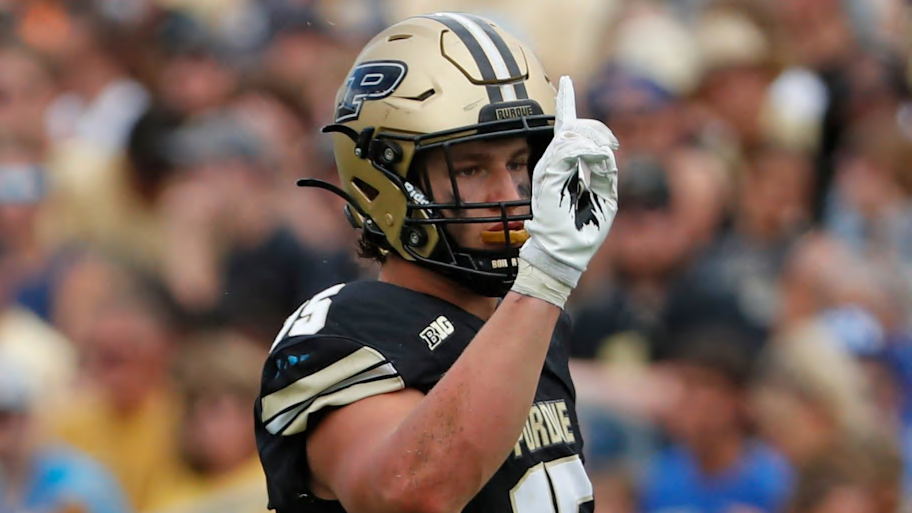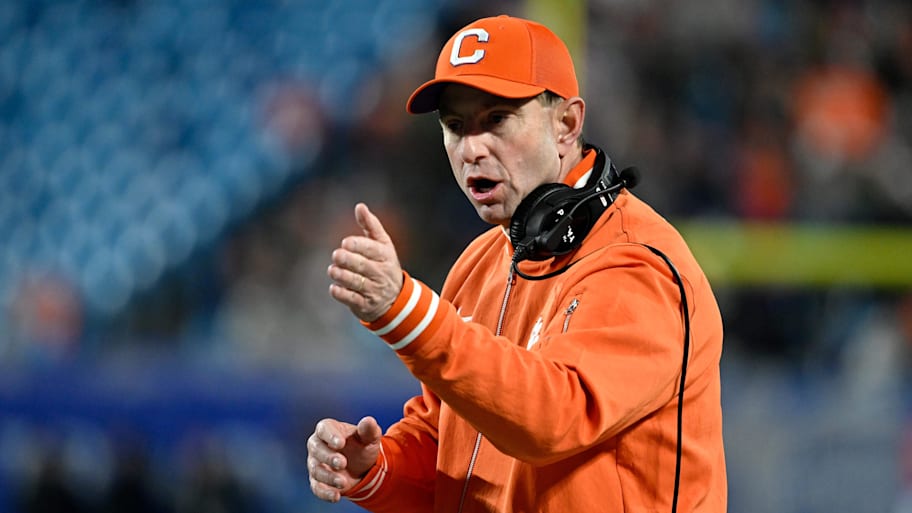It has been a big week around the Clemson Tigers’ football office.
The team has been finishing final preparation for its College Football Playoff first-round game against the Texas Longhorns. Final exams are over and graduation will take place Thursday for a select number of players prior to jetting off to Austin this weekend.
Perhaps the notable first bit of news came out of relatively nowhere Wednesday. Clemson announced it actually dipped into the transfer portal for a player of note and signed wide receiver Tristan Smith of the Southeast Missouri State Redhawks. An all-conference selection out of the FCS ranks, bringing in the 6' 5" Smith would have been barely worth a mention at other programs.
But this is Clemson, where coach Dabo Swinney has acted like using the portal is anathema to how you’re supposed to build a football team.
While numerous programs have turned over their rosters with upwards of 60 new players each year—and well over 2,000 players have entered the portal this offseason—Smith is just the third transfer the Tigers have taken since players were allowed to change schools without sitting out a year. On Thursday, former Purdue Boilermakers defense end Will Heldt also committed to the Tigers from the portal. The only other programs operating with such limited numbers are the service academies.
“We had two depth guys that moved on so we needed to get a guy. Really like our guys in the room, but again you’ve got to have some depth. We needed to find a receiver,” Swinney said of Smith. “Obviously, the high school [signing period] was over and there wasn’t really anybody else out there that we felt like we could go get. Everybody makes a big deal about it, but we’ve signed a guy out of the portal three out of the last four years. It’s not really where we live.”
You could say that a few dozen times over.
As the program prepares to make a seventh appearance in the CFP this week—and first in the 12-team edition after becoming the inaugural bid-stealer as ACC champion—the question lingers about the unique approach heading into the matchup with the Longhorns.
Is Swinney’s modus operandi sustainable in an era of vast player movement, or is this trip to the CFP simply covering up the cracks of a program that has seriously reversed course from the days where they were the gold standard in the sport while winning national titles in 2016 and ’18?
As Swinney mentioned, he has taken transfers before—but it hasn’t been done in the name of improving the depth chart as much as supplementing it in a handful of very specific cases.
Quarterback Hunter Johnson could best be described as a boomerang, rejoining the program in 2022 after he initially transferred out from Clemson as part of a short stint with the Northwestern Wildcats. His return was mostly driven by the desire to get into coaching, and he appeared in just two games as part of mop-up duty.
Fellow signal-caller Paul Tyson joined a year later after making his way from the Alabama Crimson Tide to the Arizona State Sun Devils and has attempted just four passes.
Both were transfers by the technical definition, but their impact was felt far more on the practice field than in actual games (which the Tigers have been losing far more often as of late).
“When we have a need and can’t address it through high school, we fill our need,” Swinney said. “We didn’t have a need last year. This year, we didn’t have any intention, but we had two guys leaving so we needed a receiver. Process was pretty simple, we looked at a lot of guys, we were looking for something very specific. Tristan fit that.”

Smith, a Georgia native who made a detour through the junior college ranks before winding up at SEMO, and Heldt have the chance to change the tune on transfers at Clemson.
No matter how their careers ultimately pan out in orange and white, it still remains striking how Clemson’s approach differs from much of its competition for the level it still sees itself as capable of reaching.
The top-ranked Oregon Ducks have excelled at bringing in impact transfers and are led by quarterback Dillon Gabriel, the NCAA’s all-time leader in touchdowns who is on his third school. The Indiana Hoosiers essentially imported part of the James Madison Dukes’ roster from last year to help produce the best season in school history. The Notre Dame Fighting Irish nabbed signal-caller Riley Leonard from the Duke Blue Devils and a decent amount of the $20 million or so that the Ohio State Buckeyes are spending on their roster was part of an outlay to lure the likes of safety Caleb Downs up north.
Even Texas, with access to vast amounts of high school talent just a drive away, has a starting quarterback who began his career in Columbus, Ohio. The SMU Mustangs have a top tailback who arrived via the Miami Hurricanes and got all of their starting defensive linemen out of the portal from Power 4 schools. Potential Peach Bowl opponent and the Big 12 champion Arizona State Sun Devils are led by running back Cam Skattebo, who arrived from FCS Sacramento State as the Big Sky Offensive Player of the Year in 2022.
Yet it’s hard to read things as anything other than lil’ ol’ Clemson just dipping its toes into such waters.
In theory, upcoming changes to college football could help accelerate Swinney’s metamorphosis. The veteran coach has been vocal about his dislike about paying players using boosters or collectives under the umbrella of NIL deals, but such checks could be coming directly from the school in 2025 as part of revenue-sharing should the House v. NCAA case be settled in April as it is on track to do. The school has already announced plans to fully share the $20.5 million benchmark figure next season—the bulk will go to supporting the football team.
Clemson, already one of the leaders in FBS when it comes to roster retention thanks to a strong culture and focus inward, could wind up being one of the biggest beneficiaries from the change.
That is, if they want to wade deeper into such waters. Because the bottom line is that something has to change for the Tigers. Clemson has 10 total losses in the past three campaigns. That’s as many as the team took combined during the peak of their dominance of the sport from 2014 through ’20.
After finishing inside the top 10 of 247Sports’s team high school recruiting rankings in 2018 and in the top five in ‘20, Clemson slipped to a shocking 27th in the past cycle.
The Tigers signed no five-stars last week and ended up with just six blue-chip commits. They’ve never even made a brief appearance in the recruiting website’s top-100 team transfer rankings—outpaced by the likes of the Eastern Washington Eagles and Utah Tech Trailblazers.
You could note it’s worked enough to the point where their fate is in their hands to win a national championship in the expanded field. The better summation is that Clemson took advantage of a sport where parity is on the rise and it won the only game that mattered to lock up an automatic bid.
We’ll find out what the short-term payoff will be on Saturday afternoon against Texas. Longer term, things still appear TBD.
At least for Swinney, things are changing enough that he devoted more than half of his final time speaking to the media before kickoff by discussing, gasp, honest-to-goodness transfer talk.
A novel concept that seems to be finally seeing the light of day at Clemson.
More College Football on Sports Illustrated
This article was originally published on www.si.com as Clemson Reaching Transfer Portal Crossroads Ahead of College Football Playoff Return.
